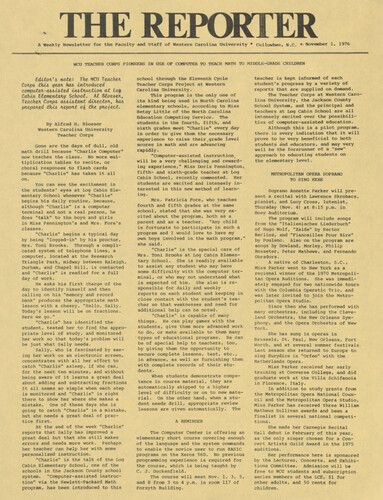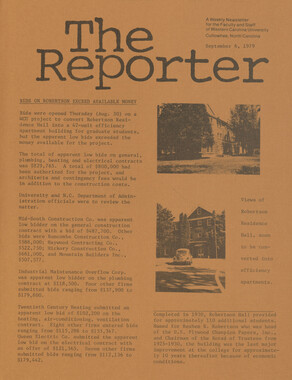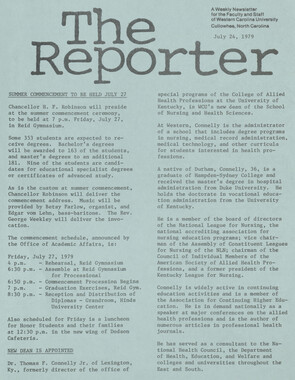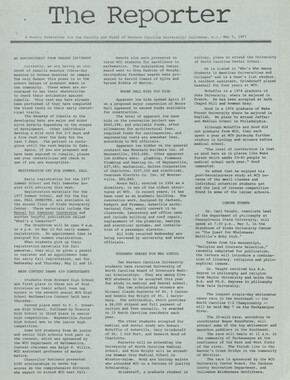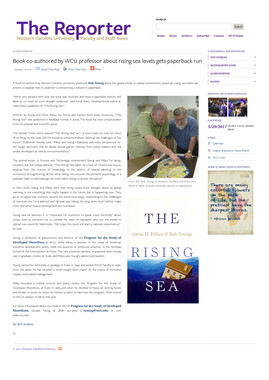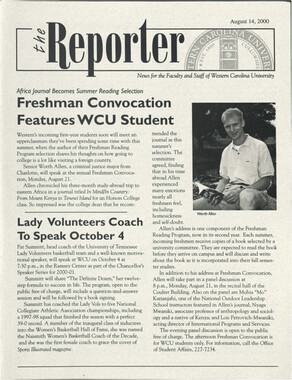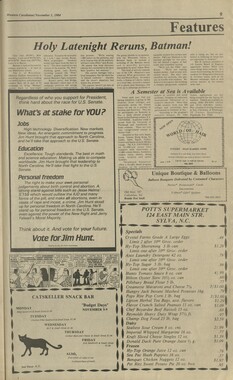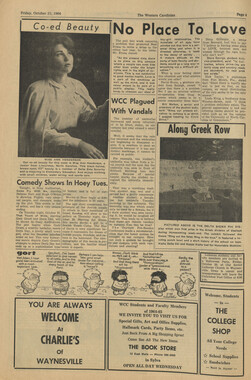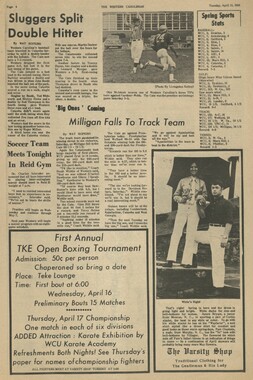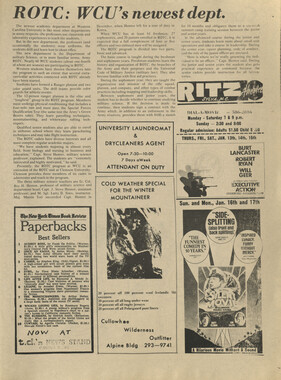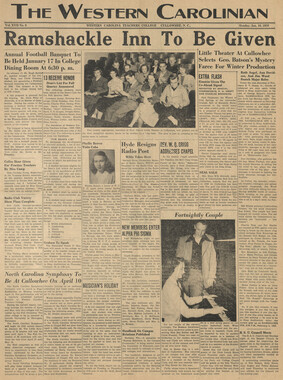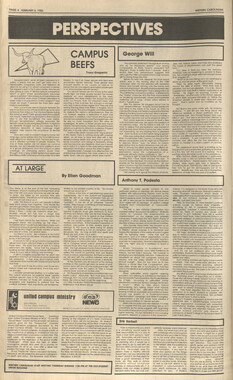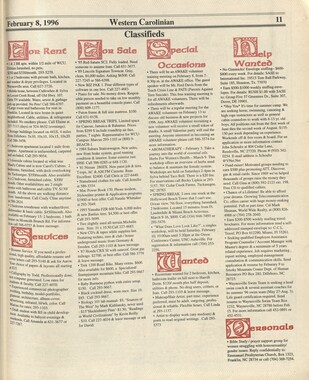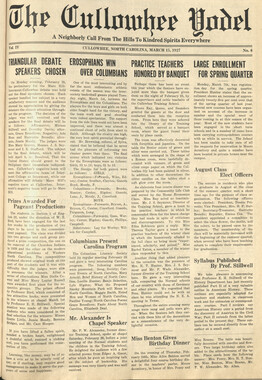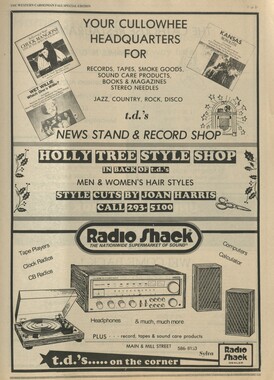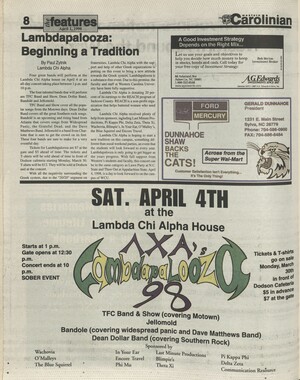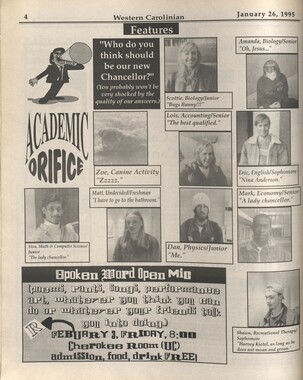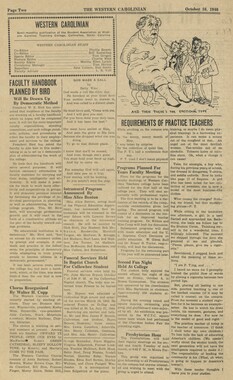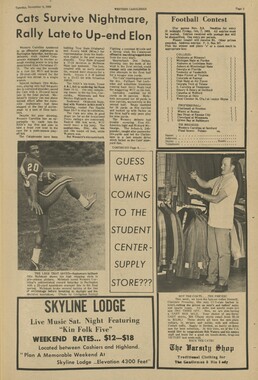Western Carolina University (20)
View all
- Canton Champion Fibre Company (2308)
- Cherokee Traditions (293)
- Civil War in Southern Appalachia (165)
- Craft Revival (1942)
- Great Smoky Mountains - A Park for America (2767)
- Highlights from Western Carolina University (430)
- Horace Kephart (941)
- Journeys Through Jackson (154)
- LGBTQIA+ Archive of Jackson County (24)
- Oral Histories of Western North Carolina (314)
- Picturing Appalachia (6772)
- Stories of Mountain Folk (413)
- Travel Western North Carolina (160)
- Western Carolina University Fine Art Museum Vitreograph Collection (129)
- Western Carolina University Herbarium (92)
- Western Carolina University: Making Memories (708)
- Western Carolina University Publications (2283)
- Western Carolina University Restricted Electronic Theses and Dissertations (146)
- Western North Carolina Regional Maps (71)
- World War II in Southern Appalachia (131)
University of North Carolina Asheville (6)
View all
- Allanstand Cottage Industries (62)
- Appalachian National Park Association (53)
- Bennett, Kelly, 1890-1974 (1388)
- Berry, Walter (76)
- Brasstown Carvers (40)
- Carver, George Washington, 1864?-1943 (26)
- Cathey, Joseph, 1803-1874 (1)
- Champion Fibre Company (233)
- Champion Paper and Fibre Company (297)
- Cherokee Indian Fair Association (16)
- Cherokee Language Program (22)
- Crowe, Amanda (40)
- Edmonston, Thomas Benton, 1842-1907 (7)
- Ensley, A. L. (Abraham Lincoln), 1865-1948 (275)
- Fromer, Irving Rhodes, 1913-1994 (70)
- George Butz (BFS 1907) (46)
- Goodrich, Frances Louisa (120)
- Grant, George Alexander, 1891-1964 (96)
- Heard, Marian Gladys (60)
- Kephart, Calvin, 1883-1969 (15)
- Kephart, Horace, 1862-1931 (313)
- Kephart, Laura, 1862-1954 (39)
- Laney, Gideon Thomas, 1889-1976 (439)
- Masa, George, 1881-1933 (61)
- McElhinney, William Julian, 1896-1953 (44)
- Niggli, Josephina, 1910-1983 (10)
- North Carolina Park Commission (105)
- Osborne, Kezia Stradley (9)
- Owens, Samuel Robert, 1918-1995 (11)
- Penland Weavers and Potters (36)
- Roberts, Vivienne (15)
- Roth, Albert, 1890-1974 (142)
- Schenck, Carl Alwin, 1868-1955 (1)
- Sherrill's Photography Studio (2565)
- Southern Highland Handicraft Guild (127)
- Southern Highlanders, Inc. (71)
- Stalcup, Jesse Bryson (46)
- Stearns, I. K. (213)
- Thompson, James Edward, 1880-1976 (226)
- United States. Indian Arts and Crafts Board (130)
- USFS (683)
- Vance, Zebulon Baird, 1830-1894 (1)
- Weaver, Zebulon, 1872-1948 (58)
- Western Carolina College (230)
- Western Carolina Teachers College (282)
- Western Carolina University (1794)
- Western Carolina University. Mountain Heritage Center (18)
- Whitman, Walt, 1819-1892 (10)
- Wilburn, Hiram Coleman, 1880-1967 (73)
- Williams, Isadora (3)
- Cain, Doreyl Ammons (0)
- Crittenden, Lorraine (0)
- Rhodes, Judy (0)
- Smith, Edward Clark (0)
- Appalachian Region, Southern (2393)
- Asheville (N.C.) (1887)
- Avery County (N.C.) (26)
- Blount County (Tenn.) (161)
- Buncombe County (N.C.) (1664)
- Cherokee County (N.C.) (283)
- Clay County (N.C.) (555)
- Graham County (N.C.) (233)
- Great Smoky Mountains National Park (N.C. and Tenn.) (481)
- Haywood County (N.C.) (3522)
- Henderson County (N.C.) (70)
- Jackson County (N.C.) (4692)
- Knox County (Tenn.) (25)
- Knoxville (Tenn.) (12)
- Lake Santeetlah (N.C.) (10)
- Macon County (N.C.) (420)
- Madison County (N.C.) (211)
- McDowell County (N.C.) (39)
- Mitchell County (N.C.) (132)
- Polk County (N.C.) (35)
- Qualla Boundary (981)
- Rutherford County (N.C.) (76)
- Swain County (N.C.) (2113)
- Transylvania County (N.C.) (247)
- Watauga County (N.C.) (12)
- Waynesville (N.C.) (68)
- Yancey County (N.C.) (72)
- Aerial Photographs (3)
- Aerial Views (60)
- Albums (books) (4)
- Articles (1)
- Artifacts (object Genre) (228)
- Biography (general Genre) (2)
- Cards (information Artifacts) (38)
- Clippings (information Artifacts) (191)
- Crafts (art Genres) (622)
- Depictions (visual Works) (21)
- Design Drawings (1)
- Drawings (visual Works) (184)
- Envelopes (73)
- Facsimiles (reproductions) (1)
- Fiction (general Genre) (4)
- Financial Records (12)
- Fliers (printed Matter) (67)
- Glass Plate Negatives (381)
- Guidebooks (2)
- Internegatives (10)
- Interviews (811)
- Land Surveys (102)
- Letters (correspondence) (1013)
- Manuscripts (documents) (619)
- Maps (documents) (159)
- Memorandums (25)
- Minutes (administrative Records) (59)
- Negatives (photographs) (5835)
- Newsletters (1285)
- Newspapers (2)
- Occupation Currency (1)
- Paintings (visual Works) (1)
- Pen And Ink Drawings (1)
- Periodicals (193)
- Personal Narratives (7)
- Photographs (12975)
- Plans (maps) (1)
- Poetry (6)
- Portraits (1663)
- Postcards (329)
- Programs (documents) (151)
- Publications (documents) (2237)
- Questionnaires (65)
- Scrapbooks (282)
- Sheet Music (1)
- Slides (photographs) (402)
- Sound Recordings (796)
- Specimens (92)
- Speeches (documents) (15)
- Tintypes (photographs) (8)
- Transcripts (322)
- Video Recordings (physical Artifacts) (23)
- Vitreographs (129)
- Text Messages (0)
- A.L. Ensley Collection (275)
- Appalachian Industrial School Records (7)
- Appalachian National Park Association Records (336)
- Axley-Meroney Collection (2)
- Bayard Wootten Photograph Collection (20)
- Bethel Rural Community Organization Collection (7)
- Blumer Collection (5)
- C.W. Slagle Collection (20)
- Canton Area Historical Museum (2110)
- Carlos C. Campbell Collection (282)
- Cataloochee History Project (65)
- Cherokee Studies Collection (4)
- Daisy Dame Photograph Album (5)
- Daniel Boone VI Collection (1)
- Doris Ulmann Photograph Collection (112)
- Elizabeth H. Lasley Collection (1)
- Elizabeth Woolworth Szold Fleharty Collection (4)
- Frank Fry Collection (95)
- George Masa Collection (173)
- Gideon Laney Collection (452)
- Hazel Scarborough Collection (2)
- Hiram C. Wilburn Papers (28)
- Historic Photographs Collection (236)
- Horace Kephart Collection (861)
- Humbard Collection (33)
- Hunter and Weaver Families Collection (1)
- I. D. Blumenthal Collection (4)
- Isadora Williams Collection (4)
- Jesse Bryson Stalcup Collection (47)
- Jim Thompson Collection (224)
- John B. Battle Collection (7)
- John C. Campbell Folk School Records (80)
- John Parris Collection (6)
- Judaculla Rock project (2)
- Kelly Bennett Collection (1407)
- Love Family Papers (11)
- Major Wiley Parris Civil War Letters (3)
- Map Collection (12)
- McFee-Misemer Civil War Letters (34)
- Mountain Heritage Center Collection (4)
- Norburn - Robertson - Thomson Families Collection (44)
- Pauline Hood Collection (7)
- Pre-Guild Collection (2)
- Qualla Arts and Crafts Mutual Collection (12)
- R.A. Romanes Collection (681)
- Rosser H. Taylor Collection (1)
- Samuel Robert Owens Collection (94)
- Sara Madison Collection (144)
- Sherrill Studio Photo Collection (2558)
- Smoky Mountains Hiking Club Collection (616)
- Stories of Mountain Folk - Radio Programs (374)
- The Reporter, Western Carolina University (510)
- Venoy and Elizabeth Reed Collection (16)
- WCU Gender and Sexuality Oral History Project (32)
- WCU Mountain Heritage Center Oral Histories (25)
- WCU Oral History Collection - Mountain People, Mountain Lives (71)
- WCU Students Newspapers Collection (1744)
- Western North Carolina Tomorrow Black Oral History Project (69)
- William Williams Stringfield Collection (2)
- Zebulon Weaver Collection (109)
- African Americans (390)
- Appalachian Trail (35)
- Artisans (521)
- Cherokee art (84)
- Cherokee artists -- North Carolina (10)
- Cherokee language (21)
- Cherokee pottery (101)
- Cherokee women (208)
- Church buildings (167)
- Civilian Conservation Corps (U.S.) (110)
- College student newspapers and periodicals (1830)
- Dams (103)
- Dance (1023)
- Education (222)
- Floods (61)
- Folk music (1015)
- Forced removal, 1813-1903 (2)
- Forest conservation (220)
- Forests and forestry (917)
- Gender nonconformity (4)
- Great Smoky Mountains National Park (N.C. and Tenn.) (159)
- Hunting (38)
- Landscape photography (10)
- Logging (103)
- Maps (84)
- Mines and mineral resources (8)
- North Carolina -- Maps (18)
- Paper industry (38)
- Postcards (255)
- Pottery (135)
- Railroad trains (71)
- Rural electrification -- North Carolina, Western (3)
- School integration -- Southern States (2)
- Segregation -- North Carolina, Western (5)
- Slavery (5)
- Sports (452)
- Storytelling (245)
- Waterfalls -- Great Smoky Mountains (N.C. and Tenn.) (66)
- Weaving -- Appalachian Region, Southern (280)
- Wood-carving -- Appalachian Region, Southern (328)
- World War, 1939-1945 (173)
The Reporter, November 1976
-
The Reporter is a publication produced by Western Carolina University featuring news, events, and campus community updates for faculty and staff. The publication began in August of 1970 and continues digitally today. Click on the link in the “Related Mate
-
-
THE REPORTER A Weekly Newsletter for the Faculty and Staff of Western Carolina University * Cullowhee, N.C. * November 1, 1976 WCU TEACHER CORPS PIONEERS IN USE OF COMPUTER TO TEACH MATH TO MIDDLE-GRADE CHILDREN EdLLtoA'A no te,: The WCU TeacheA ColpA this ifQjxA. kaA IntAodaced computeA-aA&iAtexl InAtAuction at Log Cabin ElementaAy School. AI BloeAeA, TeacheA Coip6 aA&l6tant diAectoA, haA pAcpaAed thl& Aepoit o& the pAoject. By Alfred H. Bloeser Western Carolina University Teacher Corps Gone are the days of dull, old math drill because "Charlie Computer" now teaches the class. No more multiplication tables to recite, or choral responses to flash cards because "Charlie" has taken it all on. You can see the excitement in the students' eyes at Log Cabin Elementary School whenever "Charlie" begins his daily routine, because, although "Charlie" is a computer terminal and not a real person, he does "talk" to the boys and girls in Miss Pennington's and Mrs. Fore's classes. "Charlie" begins a typical day by being "logged-in" by his proctor, Mrs. Toni Brooks. Through a complicated system of telephone lines, a computer, located at the Research Triangle Park, midway between Raleigh, Durham, and Chapel Hill, is contacted and "Charlie" is readied for a full day of work. He asks his first charge of the day to identify himself and then calling on his "memory and record bank" produces the appropriate math lesson with a cheery, "Hello, Sally. Today's lesson will be on fractions. Here we go." "Charlie" has identified the student, tested her to find the appropriate level of study, and monitored her work so that today's problem will be just what Sally needs. Sally, who is fascinated by seeing her work on an electronic screen, concentrates with all her effort to catch "Charlie" asleep, if she can, for the next ten minutes, and without being aware of it learns a great deal about adding and subtracting fractions It all seems so simple when each step is monitored and "Charlie" is right there to show her where she makes a mistake. One of these days she is going to catch "Charlie" in a mistake, but she needs a great deal of practice first. At the end of the week "Charlie" reports that Sally has improved a great deal but that she still makes errors and needs more work. Perhaps her teacher can help her with some personalized instruction. "Charlie" is the talk of the Log Cabin Elementary School, one of the schools in the Jackson County school system. "Computer-assisted instruction" via the Hewlett-Packard Math program, has been introduced to this school through the Eleventh Cycle Teacher Corps Project at Western Carolina University. This program is the only one of its kind being used in North Carolina elementary schools, according to Miss Betsy Little of the North Carolina Education Computing Service. The students in the fourth, fifth, and sixth grades meet "Charlie" every day in order to give them the necessary experience to raise their.grade ievel scores in math and are advancing rapidly. "Computer-assisted instruction will be a very challenging and rewarding experience," Miss Doris Pennington, fifth- and sixth-grade teacher at Log Cabin School, recently commented. Her students are excited and intensely interested in this new method of learning. Mrs. Patricia Fore, who teaches fourth and fifth grades at the same school, stated that she was very excited about the program, both as a parent and as a teacher. "Any child is fortunate to participate in such a program and I would love to have my own boys involved in the math program," she said. "Charlie" is the special care of Mrs. Toni Brooks at Log Cabin Elementary School. She is readily available to assist any student who may have some difficulty with the computer terminal, or who may not understand what is expected of him. She also is responsible for daily and weekly reports on each student and keeping in close contact with the student's teacher so that weaknesses and need for additional help can be noted. "Charlie" is capable of many things. He can play games with the students, give them more advanced work to do, or make available to them many types of educational programs. He can be of special help to teachers, too, by giving them the opportunity to secure complete lessons, test, etc., in advance, as well as furnishing them with complete records of their students . When students demonstrate competence in course material, they are automatically skipped to a higher level of difficulty or on to new material. On the other hand, when a student needs drill, appropriate review lessons are given automatically. The A REMINDER The Computer Center is offering an elementary short course covering enough of the language and the system commands to enable the novice user to run BASIC programs on the Xerox 560. No previous programming experience is required for the course, which is being taught by C. J. Duckenfield. The course will meet Nov. 1, 3, 5, and 8 from 3 to 4 p.m. in room 117 of Forsyth Building. teacher is kept informed of each student's progress by a variety of reports that are supplied on demand. The Teacher Corps at Western Carolina University, the Jackson County School System, and the principal and teachers at Log Cabin School are all intensely excited over the possibilities of computer-assisted education. Although this is a pilot program, there is every indication that it will prove to be very beneficial to both students and educators, and may very well be the forerunner of a "new" approach to educating students on the elementary level. METROPOLITAN OPERA SOPRANO TO SING HERE Soprano Annette Parker will present a recital with Lawrence Skrobacs, pianist, and Lucy Cross, lutenist, Thursday (Nov. 4) at 8:15 p.m. in Hoey Auditorium. The program will include songs from the "Italienisches Liederbuch" of Hugo Wolf, "Zaide" by Hector Berlioz, and "Fiancailles Pour Rire" . by Poulenc. Also on the program are songs by Dowland, Morley, Philip Rosseter, Peter Mathews, and Fernando Obradors. A native of Charleston, S.C., Miss Parker went to New York as a regional winner of the 1970 Metropolitan Opera Auditions. She was immediately engaged for two nationwide tours with the Columbia Operatic Trio, and was later invited to join the Metropolitan Opera Studio. Since then she has performed with many orchestras, including the Cleveland Orchestra, the New Orleans Symphony, and the Opera Orchestra of New York. She has sung in operas in Brussels, St. Paul, New Orleans, Fort Worth, and at several summer festivals. Last season she returned to Europe to sing Eurydice in "Orfeo" with the Netherlands Opera. Miss Parker received her early training at Converse College, and did graduate work at the Villa Schifanoia in Florence, Italy. In addition to study grants from the Metropolitan Opera National Council and the Metropolitan Opera Studio, Miss Parker has received three William Matheus Sullivan awards and been a finalist in several national competitions. She made her Carnegie Recital Hall debut in February of this year, as the only singer chosen for a Concert Artists Guild Award in the 1975 auditions. Her performance here is sponsored by the Lectures, Concerts, and Exhibitions Committee. Admission will be free to WCU students and subscription series members of the LCE, $1 for other adults, and 50 cents for children. ARTS AND SCIENCES ADVISORY GROUP NAMED John McCrone (dean, Arts and Sciences) has appointed a Dean's Student Advisory Committee within the School of Arts and Sciences. The Student Advisory Committee consists of one student selected from each department in the School. The duty of this committee is to advise the Dean on matters of common interest and concern to the students and student body. The following students were selected for Arts and Sciences Student Advisory Committee for 1976-77: Bryan McDowell, Art; Alice Bowers, Biology; Orvilla Smith, Chemistry; Peter Palmer, Earth Sciences; Susan Allman, English; Mary Church, History; Denise Lilley, Mathematics; Vincent Clark, Physics; Stacy Rae Place, Military Science; Sandra Crews, Modern Foreign Languages; Jacqueline Culpepper, Music; Nancy Hope, Political Science; Wanda Mull, Social Work; Rob Daves, Sociology and Anthropology; and Sam Gray, Speech and Theatre Arts. The committee already has held its first meeting and will meet as convenient during the quarter to discuss items of interest and concern to the students. PIEDMONT BRASS QUINTET TO PERFORM The Piedmont Brass Quintet, WCU's resident instrumental ensemble, will present its first home performance of the season Nov. 11 at 8:15 p.m. in Hoey Auditorium. The program will include six selections representing four centuries. "Die Bankelsangerlieder" is an anonymous work written around 1684, Hein-rich Finck's "Greiner Zanner" dates from the late 15th or early 16th century, and "Contrapunctus I" from J. S. Bach's "Art of the Fugue" is an early 18th century work. Three 20th century works will complete the program—Morley Calvert's "Suite from the Monteregian Hills," Ingolf Dahl's "Music for Brass Instruments" (1944), and "Sonatine" (1951) by Eugene Bozza. The members of the Piedmont Brass Quintet are Mary Lazarus and Ned Gardner, trumpet; Gordon Campbell, French horn; John Woolley, trombone; and John Sizemore. Each of them is a visiting artist-in-residence at WCU, and serves as a brass instructor in the Department of Music. The group's musical director is Mary Lazarus. The quintet was organized three years ago in Winston-Salem, and chose the name "Piedmont" to honor the people of the region whose support nurtured the group during its early years. The performance here is sponsored by the Department of Music. There will be no admission charge. "HOT L BALTIMORE" TO RUN HERE "Hot 1 Baltimore," the Lanford Wilson comedy that won the New York Critics Circle Award, will be the University Players' next production. It will be performed at 7:30 p.m. November 11-13 and 15-18 in the Little Theatre in Stillwell Science Building. Stephen L. Carr, instructor in speech and theatre arts, will direct the production with the assistance of Mike Gundy of High Point. The play is set in the lobby of the run-down Hotel Baltimore, so seedy that the letter "e" is missing from its marquee. The everyday encounters of the hotel residents during the course of one day form a mosaic of human comedy. Members of the cast include Beth Thomas, Cathy Dixon, and Dennis West of Cullowhee, David Dorsey of Sylva, Carolyn Fulton of Franklin, Vanessa Drake of Hendersonville, Tom Caudle of Waynesville, Ken Stikeleather of Wax-haw, Frank Joyner and Susan Davis of Winston-Salem, Dan Spence of Roanoke Rapids, Diana Marshall of Pfafftown, Tonya Lamm of Wilson,' Tim Dickenson of Greensboro, and Armando Erba of New Haven, Conn. Tickets are $2 for adults, $1 for students, and 50 cents for children. All seats are reserved, and tickets are available from the Department of Speech and Theatre Arts, telephone 293-7491. MADRIGAL DINNER TICKETS ON SALE MONDAY The Madrigal Christmas Dinners, a popular holiday entertainment at WCU from 1970 through 1973, will be resumed this year. Dinners will be held in the Grandroom of Hinds University Center Nov. 30 and Dec. 1. Admission will be $5 and will include the cost of dinner and the musical entertainment. Tickets for this year's dinners will go on sale Monday (Nov. 8) at 9 9 a.m. at the information desk of Hinds University Centfer. Seating is limited, and no reservations will be accepted before Monday at 9 a.m. The dinners have traditionally been sellouts. The Grandroom will accommodate 340 patrons each night. As in previous years, there will be 10 seats to a table, and individuals may purchase tickets singly or in groups. For purposes of the madrigal dinners, the Grandroom becomes an Elizabethan banquet hall. The dinners are served with wassail bowl, boar's head, trumpet fanfares, and other pageantry in the manner of the 16th century. The dinners have been cancelled for the past two years because final examinations were held the week after Thanksgiving, when the dinners would normally have been scheduled. i/ KOINONIA HOUSE LUNCHEON A "Soup and Sandwich" Luncheon will be held from 12 until 12:5fr*p.m. each Tuesday through November 16 at the Koinonia House (Baptist Student Union). A period of informal dialogue and sharing between faculty and students will be held along with the meal. Persons wishing to attend may call 293-9030 from 1:00 p.m. Tuesday until 5:30 p.m. the following Monday to make reservations at the rate of $1 per person. The speaker for next Tuesday (Nov. 9) will be Dr. Lewis Sutton, and the luncheon will feature beef or pork roast. WITH THE FACULTY Thomas B. Westcott (CAP Center) recently attended the Southeastern Conference of Counseling Center Personnel at Appalachian State University. Or. Westcott presented a paper entitled "New Relationships for Service to the Campus Community: The Counseling, Advising and Placement Center at Western Carolina University." The Department of Information Systems hosted the North Carolina Association for Educational Data Systems at A-B Tech in Asheville on October 18. Drs. Beegle, Hunter, Morton, and Woods attended the conference. Dr. Hunter was elected to a three-year term with the Board of Directors. Dr. John Bennett (Philosophy and Religion) spoke at the luncheon on "Colonel Elliott White Springs: Industrial and Literary Maverick." Bob Mason (School of Nursing and Health Sciences) participated in a workshop at the University of Kentucky in Lexington during the week of October 17. The workshop was designed to instruct participants on the development and implementation of "Interdisciplinary Continuing Education Programs in Allied Health." Wilma B. Cosper (head, Home Economics) was elected Vice-Chairperson of the Southwestern Child Development Commission Board at a recent meeting in Franklin. Tom O'Toole (History) attended a Guided Designs System Approach Workshop sponsored by the Exxon Education Foundation Impact Program October 13- 15 at West Virginia University. Bob Mason (Nursing and Health Sciences) attended the statewide meeting of the North Carolina Area Health Education centers in Boone on October 27 and 28 where he presented a paper entitled "AHEC and the Community College." Donald Josif (Earth Sciences) was coordinator for the North Carolina Geographical Society's annual meeting, October 22-23, in Asheville. WCU and ASU were co-hosts for the meeting. THE REPORTER A Weekly Newsletter for the Faculty and Staff of Western Carolina University * Cullowhee, N.C. * November 10, 1976 PRESENTATION OF DISTINGUISHED SERVICE, OTHER AWARDS MARKS 1976 HOMECOMING The vice president of IBM's European marketing and services operations and the president-elect of the North Carolina Association of Educators won Western Carolina University's Alumni Distinguished Service awards Saturday night. Raymond H. Fentriss of Paris, France, a 1956 graduate, received the award for service outside the field of education and Mrs. Linda Israel Rader of Gastonia, a Canton native and a 1958 graduate, received the award for service in the field of education. The presentations were made by Dr. H. F. Robinson, chancellor, at the Alumni Association annual awards banquet in the Waynesville Country Club. The banquet climaxed the university's 1976 Homecoming celebrations that included the selection of Miss Melanie Ann Shore of Peachtree City, Ga., as homecoming queen. She was crowned by Chancellor Robinson at the half-time of the WCU-Lenoir-Rhyne football game. Other members of the court afe Kimber'ly Cockman of Brown Summit, Andrea Zaher of Pembroke Pines, Fla., Allison Miller of Rockwell, Patricia Mitchum of Monroe and LeAnne West of Greenville (N.C.). Bob Terrell, associate editor of the Citizen-Times and well-known columnist and author, a member of the WCU class of 1951, spoke at the evening banquet, recounting many of the humorous experiences he has had as a newspaperman. Two other members of the 1951 class shared the podium with Terrell— Herbert L. Hyde, Asheville attorney, as master of ceremonies, and Charles West of CBS news in New York, who was in charge of presenting other special awards. Fentriss, who with his wife, Jane, also a WCU graduate, came from Paris for the occasion, joined IBM the year he graduated and moved up rapidly in the corporation. Four years after starting with IBM as a sales trainee, he was singled out by A. K. Watson, president of IBM World Trade Corporation to become his administrative assistant. In a series of appointments, Fentriss became regional manager of IBM operations in Germany, Switzerland and Austria, and was picked to manage IBM's entry into the Eastern European Socialist countries, tice first. In 1972, when the United States and Russia embarked on "detente," Fentriss began a study of the USSR market and the next year was named to head up the corporation's business efforts in the Soviet Union. About a year ago, he moved back to Paris to assume the vice presidency in Europe. Mrs. Rader, who earned both her bachelor's and master's degrees at WCU, has taught in the Gaston County and Gastonia school systems since her graduation. As president-elect of the state's major educational association, she will take over its leadership in April, 1977. In 1962, she was a Fulbright Exchange Program teacher in England and later was chosen by the National Education Association as one of the outstanding women in education in the United States, receiving that honor for her role in elevating the standards of the teaching profession. She has been a member of the NCAE board of directors, member of the General Assembly's special committee to study the teacher's retirement system, a member of the Governor's Study Committee on Relationships Between Boards of Education and Professional Educators, a member of the State Board of Education Committee to Study Sick Leave and Substitute Teacher Regulations, a member and vice chairman of the NCAE Professional Rights and Responsibilities Commission, vice president of the North Carolina Association of Classroom Teachers, president of the Gastonia Association of Childhood Education, and a delegate to the NEA national convention. Two special awards made at the banquet went to the alumni chapter with the most members present from the farthest distance—Florida chapter—and the individual alumnus traveling the greatest distance (other than Fentriss) to attend the meeting— Dr. Robert Failing of Santa Barbara, Calif. An additional "Unsung Hero" award was presented to Doug Reed, WCU Director of Public Information, for selfless and dedicated" service to the alumni association. Theme for this year's on-campus homecoming parade and other activities was "Catstruction '76," in recognition of several multi-million dollar building projects currently under way. Professor Sue Fields was chairman of the homecoming committee and alumni activities were planned under the direction of James A. Ballard, director of development and alumni affairs, and two staff members, Mrs. Jean Robinson and Miss Toni Knott. WCU'S HONORS PROGRAM—A FIRST REPORT Most people, especially students, would agree that it's hard to get professors and students to agree. But in a few special classes at Western Carolina University, the students are doing more talking, the professors are doing more listening, and both agree that the students are coming away with more knowledge than is usually gleaned in traditionally structured courses. These honors courses are five beginning classes for freshmen in chemistry, biology, philosophy, anthropology, and history. Dr. Ellerd M. Hulbert, interim chairman of the honors faculty who is teaching the history honors class this quarter, said that one of the reasons the honors program was begun at WCU was the quality of students. "Western Carolina is getting a substantial number of high quality students from high schools," the history professor said, "and we have to insure that they are working at their capacity." The honors students were invited to take any of the courses on the basis of their high SAT scores or class rank. Although Dr. Hulbert said it was too early to appraise the effects of the program, the faculty is encouraged and plans are being made to offer upper level honors courses in subsequent years. Next year the honors courses will be offered as the present freshmen become sophomores, so that in four years honors programs will be available during all four years of undergraduate work. Three of the five courses have a second part—chemistry, biology, and history—and the second part of the sequence will be offered during the winter quarter. Instead of anthropology, an introductory sociology honors course will be offered in the winter. In the spring quarter, honors courses in other departments will be offered. Dr. Hulbert said that WCU is exploring the possibility of offering honors courses not only in the School of Arts and Sciences but in the economics and psychology departments. What makes the honors programs different from other classes? Dr. Patrick Morris, head of the Department of Sociology and Anthropology, said his class differs in at least three ways. "The class is smaller, for one thing," he explained, "and most of the classroom time is spent in discussion rather than lecture." Dr. Morris also said there is much more work for students in his honors class to do. He said his main objective in the course is "to get the students to view their own society more objectively by looking at other societies." He indicated that the students influence the direction of the course. And the students agree. Barry Starling, a freshman from Winston-Salem, said that they were learning all the terms and methods taught in the regular sections of anthropology, but they did it through discussion of the assigned readings, rather than just sitting and listening to a lecture. Starling, who has two honors courses, also offered the opinion that the honors professors were the cream of the crop. "From what I've seen," he said, "these are the best teachers." And when you can get a freshman to praise a professor, something must be going right. WCU'S MED-TECH PROGRAM: NEW FACULTY, NEW EMPHASES There's a new look—and a new faculty—at Western Carolina University's Medical Technology Program. The new faculty is headed by Daniel K. Southern, formerly of Morganton, appointed this fall to succeed Dr. Garland E. Pendergraph as director of the med-tech program. Other new members of the faculty are B. Alston Macon, formerly of Chapel Hill, and Mrs. Norma B. Cook of Asheville. The new program look is one of curriculum design, introducing some new pre—professional courses and realigning professional course work to give students a good study base in all clinical laboratory disciplines. The new approach is a "2 plus 2" program. University requirements for a B.S. degree and all pre-professional course work are accomplished in the freshman and sophomore years. During the last two years, professional course work in medical technology is the primary emphasis. The junior year is spent learning the theory of laboratory disciplines, along with simulated hospital lab experiences conducted on-campus. In the final year, the MT student is placed in one of several modern hospital labs in the western region for an extensive internship under the direction of a registered medical technologist. During this phase, students train in every aspect of the clinical laboratory. Upon graduation, students are eligible to take the national certification examination administered by the American Society of Clinical Pathologists. Southern came to WCU this fall after three years at Western Piedmont Community College in Morganton where he established a medical laboratory technician program and was chairman of the allied health program. According to Southern, a medical technologist is an essential part of the modern day health team. "The laboratory results turned out by our highly trained professionals often form the basic data that the physician uses to make a diagnosis," he points out. Moreover, Southern notes, "once the diagnosis is made and treatment is begun, the clinical laboratory is again an important factor in monitoring therapy by continued testing. We are trying to turn out highly qualified medical technologists who will meet the challenge of today's medicine and the increasing demands of the future...a person who is knowledgeable, accurate, precise, dexterous and takes pride in the testing results handed to the physician." The "new look" to WCU's med-tech program doesn't promise to make it easy. According to Southern, "medical technology as a major is is probably one of the hardest—but most rewarding—careers that a student could enter." There have been so many advances in the laboratory sciences in the last 10 years, he says, that two years of "course work and study are required to learn the essentials of each of the five major laboratory disciplines. Then, it's possible to rise to the Ph.D. level in any one of these areas." Some medical technologists, he says, find themselves qualified to enter medical school and become doctors. That indicates, he says, the extent to which the pre-professional course work in a medical technology program is similar to a pre-medical program. Southern is a graduate of the medical technology program at Alderson- Broaddus College in West Virginia and holds the master of science degree in medical technology from West Virginia University. Mrs. Cook, who is stationed full-time in Asheville, will work with medical technology students in clinical facilities. She is a graduate of Marshall University, completed the medical technology program at the Medical College of Virginia, holds professional certification in medical technology, and received the master of arts degree from the Presbyterian School of Christian Education in Richmond. Macon is a graduate of Wake Forest University, holds the master of divinity degree from Union Theological Seminary in Richmond and this year earned the master's degree in pathology at the UNC School of Medicine in Chapel Hill. KOINONIA HOUSE LUNCHEON A "Soup and Sandwich Luncheon" will be held from 12 until 12:50 p.m. November 16 at the Koinonia House (Baptist Student Union). A period o f informal dialogue and sharing between faculty and students will be held along with the meal. Persons wishing to attend may call 293-9030 before 5:30 p.m. November 15 to make reservations at the rate of $1 per person. The speaker will be the Rev. George Wcekley, and the luncheon will feature pork and dressing. ANSEL ADAMS PHOTOS TO BE DISPLAYED An exhibition of 40 black and white photographs by the distinguished American photographer Ansel Adams will open with a public reception at 2 p.m. Sunday, November 14, in the art gallery of Carol Grotnes Belk Building. The exhibition is sponsored by the WCU Lectures, Concerts and Exhibitions committee. Adams was born in San Francisco in 1902, and made his first photograph on a visit to Yosemite Valley at the age of 14. Nearly every summer since then he has explored and photographed Yosemite and the Sierras. Adams decided to become a full-time photographer in 1930, and had his first one-man show at a New York gallery in 1936. In 1940, he helped start the first department of photography as a fine art, at the Museum of Modern Art in New York, and in 1946, he founded the department of photography of the California School of Fine / Arts in San Francisco. Also in 1946, he was awarded? the first in a series of Guggenheim Fellowships to photograph the National Parks. He is the author of a series of looks on basic photographic technique. Adams now lives in Carmel, Calif., and continues his active career as a photographer. He is involved with the Friends of Photography, a non-profit educational organization in Carmel which encourages photography in its creative aspects. He has received numerous honors during the past two decades, and his photographs have been the subject of many exhibitions and several books. The reception and the exhibition are free to the public. The exhibition will remain on display through December 5. Gallery hours are 8 a.m. until noon and 1 to 4:30 p.m. Monday through Friday, and 2-4 p.m. on Sundays. WITH THE FACULTY Glenn Arbaugh, Harry McAlum, William Morris, and Eugene Vosecky (all Accounting) participated in the ninth annual accounting seminar at Virginia Polytechnic Institute last month. The seminar concentrated on recent developments in accounting, auditing, and taxation. Ray Menze (Art) and three WCU students—Chuck Downs, Stokes Gate-wood, and Mike Miller—are among the artists represented in a photography exhibit in Rowe Gallery at the University of North Carolina at Charlotte. The exhibit, held in connection with the annual conference of the Society for Photographic Education, will be on display through Nov. 21. A reception is scheduled at 8 p.m. Nov. 19. Gordon Sanford (director, Economic Development Center) was elected chairman of the executive committee of the National Association of Management and Technical Assistance Centers at that organization's first full meeting, held Oct. 15 in Salt Lake City. The meeting was sponsored jointly by NAMTAC and the Economic Development Administration of the U.S. Department of Commerce, which provides some grant support to the EDC. Western Carolina is one of 15 institutions that participated in the founding of NAMTAC last April in Chicago. A recent WCU publication, "Western Carolina University Athletics," received an excellence award in the 1976 national design competition of the University and College Designers Association. The award, one of 150 presented in a field of 980 entries, was among seven awards given in the competition's "Publications: Recruitment" class. Art director and designer of the publication is Jim Rasor. The book features copy by Steve White and Doug Reed, with photographs by Harry Duke. Jim Rasor attended the association's annual meeting at which the awards were presented Oct. 16 at Salt Lake City. REPORTER and Staff of Western A W eekly Newsletter for the Faculty Carolina University * Cullowhee, N.C. * November 17. 1976 CAP CENTER SPEAKER TO DISCUSS FINE ARTS What are the job opportunities for college graduates who major in art or speech and theatre arts? Some answers to that question will be provided next week during a series of four public presentations by Judith Crumb, director of placement and career counseling at the School of the Museum of Fine Arts in Boston, Mass. Mrs. Crumb will speak Nov. 18 at 11 a.m. in the Little Theatre in Stillwell Science Building on "Career Possibilities for Speech and Theatre Arts Majors." At 3 p.m. that day she will present a slide show on Egyptology in room 104 of Belk Building. On Nov. 19 she will discuss "Survival for the Fine Artist" at 9 a.m. in room 278 of Belk Building. At 10 a.m. she will be the guest at a reception in the Belk Building foyer, and at 11 a.m. she will show a film about the School of the Museum of Fine Arts in Belk 104. A 1967 graduate of Emerson College, Mrs. Crumb assumed her present position in 1970. Since then she has become a recognized leader in the field of finding career opportunities for fine arts graduates. Her own background includes affiliations with numerous theatre companies in the Northeast. She is currently co-director of the Company of Players of St. John the Evangelist in Boston. In terms of artistic interests, she is a specialist on the solar worship of the Priests of On and the religious revolution of the 18th dynasty in Egypt. She is listed in "Who's Who of American Women," and is a member of Alpha Psi Omega, national honorary theatre fraternity, and Eta Phi Eta, national honorary speech fraternity for women. She serves on the executive board of the New England Association for School, College, and University Staffing. Mrs. Crumb's visit is sponsored by the Career Planning and Placement Office of the WCU Counseling, Advisement, and Placement Center. All the programs are free to the public. WCU OFFERS HELP TO SMALL BUSINESS Special consulting assistance is now available to small business firms throughout western North Carolina through the WCU School of Business. The consulting service, made possible under a contract agreement between WCU and the Small Business Administration, is provided without cost to qualifying firms seeking assistance. The service program, directed by Dr. Harry White, professor of economics, operates in conjunction with SBA's Small Business Institute, established to provide management assistance to small businesses through universities. The WCU program, one of only eight of its kind in North Carolina, provides trained graduate students to assist on a variety of problems and needs identified by client firms. Although the primary consultant and contact with the business firm is the graduate student selected for the case, the faculty of the School of Business, the Economic Development Center, and retired executives of the SCORE (Service Corps of Retired Executives) Program stand ready to advise and offer guidance in each counseling situation. Any small business firm which requests help is eligible to receive consulting assistance through the WCU project. In selecting cases from the requests, the distance factor would have to be a consideration. All of the consulting services are provided on a confidential basis and result in a formal report prepared for the firm including recommendations or suggestions for solving the problems presented. Careful attention is given to matching client firms with consultants selected from the ranks of persons enrolled in the Master of Business Administration program at the university. The consultant, with Dr. White, and possibly a representative from SBA, visit with prospective clients to identify problems and develop the work to be undertaken for the firm. The consulting assistance may take a variety of forms, from financial management to assisting in developing improved record-keeping systems, or from advertising to marketing studies— in short, virtually any area of concern to the business. Although the definition of a "small business" varies with the product or service furnished to the public, the WCU project, according to Dr. White, is intended for firms employing from one to about 25 persons. Western's consultants have worked with motor lodges, commercial photographers, electronic retailers, funeral services, and small manufacturers . Currently, the WCU project is accepting inquiries and applications from WNC firms interested in assistance. These should be directed to Dr. White in the School of Business, telephone 293-7391. ALUMNI CALENDAR FEATURES STUDENT ART Drawings by 10 WCU students are featured in a new publication, the 1977 Alumni Association Calendar. Thirteen sketches of campus scenes are included in the calendar which is being distributed to all active members of the WCU Alumni Association. The drawings were prepared in an art rendering class taught last spring by WCU art professor William Lidh. Student artists represented in the calendar are Charles Moorrees and Reeda Shawn Herndon, both of Ashe-ville, Janice Rae Swanger of Hazel-wood, Beth Proffit of Cullowhee, John D. Furches of Winston-Salem, Holly Patricia Griffin of Monroe, Melinda Meade of Fayetteville, David Surles of Charlotte, Karen Crawford of Greensboro, and J. Thomas Addison of Pelzer, S.C. Additional copies of the Calendar are available for $1.50 from the WCU Alumni Office. HOLLAND CERTIFIED BY PERSONNEL SOCIETY James R. Holland, WCU personnel officer, recently has been certified by the American Society for Personnel Administrators as an Accredited Executive in Personnel. Holland is responsible at WCU for the recruitment and selection of all non-faculty personnel, employee relations programs, and fringe benefit programs for all university personnel. Requirements for the AEP certification include a written proficiency examination, 10 years of experience or college-level education in personnel, at least three years of policy developing duties, and other administrative duties. Holland is a past president of the Higher Education Personnel Association of North Carolina and before coming to WCU was assistant personnel officer of the N. C. Department of Motor Vehicles. He has published first aid and safety articles in national safety publications and has taught first aid in Red Cross Programs. A native of Charleston, S.C., Holland is married to the former Yvonne Churchill. DR. TERANGO TO ADDRESS ASHA MEETING Dr. Larry Terango, director of the WCU Speech and Hearing Center, will chair a mini-seminar and present a paper at the annual convention of the American Speech and Hearing Association in Houston, Texas, Nov. 20-23. He will be the chairman of a seminar on the advantages of pre-school work with children with communications impairments. His paper is one of five selected for the national convention's scientific and technical session on accountability management and data collection. In the presentation of his paper, Dr. Terango will discuss an effort that has been made to develop a monthly accountability report reflecting the delivery of services provided in the Speech and Hearing Center and the estimated cost of preparing and mailing the report to approximately 45 agencies in North Carolina. The procedures and forms developed by the center for the report will be presented and discussed. DEBATE ON FACULTY EVALUATION SET Peer evaluation of facylty will be the subject of a public debate Nov. 18 at 5 p.m. in Forsyth Auditorium. James H. Horton (Biology) will argue for this kind of evaluation, and Salvatore D. Nerboso (Political Science) will argue against it. The floor will be open for questions and comments, and the public is invited. The debate is sponsored by the American Federation of Teachers Local 2437, AFL/CIO. ALL-BACH CONCERT SCHEDULED Two WCU choral groups—the Concert Choir and the Chorus—will join with two separate organists in an all-Bach concert Thursday (Nov. 18) at 8:15 p.m. in Hoey Auditorium. Dr. Betsy Farlow, associate professor of music, will perform the Prelude in B Minor for organ, and the two choral organizations will join forces for a combined performance of the "Magnificat.M Organist Henry Lofquist, assistant. professor of music, will accompany the "Magnificat," which will be conducted by Dr. Joyce Farwell, WCU artist-lecturer. Soloists will include Jacque Culpepper and Martha Chapman, sopranos; Marcia Marshall and Jean Howell, mezzo-sopranos; Darryl Jones, tenor; Ron Whittemore, baritone, and Edward Stanley, oboe. The performance, which is sponsored by the Department of Music, is free to the public. WITH THE FACULTY George W. Reeser and Donald C. Wood (Industrial Education and Technology) attended the 15th Annual Meeting of the Southeastern Industrial Arts Educators Association in Atlanta, Oct. 8-9. Julian Dobrowolski, Paul Haber-land, Dorothea Lam and Lewis Sutton (all Modern Foreign Languages) attended the joint state meeting of the American Associations of Teachers of French, German and Spanish at Salem College Oct. 16. On Oct. 1, Patrick Morris, Robert Foss, and Donald Pfost (all Sociology and Anthropology), Ermel Stepp (Administration and School Personnel), and Andrew Baggs (Political Science) participated in the organizational meeting of the Inter-University Committee for Social Science Research on Southern Appalachia held at Mars Hill College. Laurence French (Sociology and Anthropology) presented a paper, "The Cultural Factor in Defining and Identifying Sex-related Social and Personal Pathologies" at the bi-annual International Congress of Sexology meetings held in Montreal, Canada, Oct. 28-31. The program was sponsored by the University of Quebec and included speakers from Europe, Africa, Asia and North and South America. J. Dan Pittillo (Biology) and A. E. Radford of Chapel Hill presented a paper, "Natural Area Classification System: A Standardization Scheme," at the first conference on Scientific Research in the National Park in New Orleans Nov. 9-12. Wilma Cosper, Judy Dowel1, Joyce Shaw, and Francile Waters (Home Economics) attended the annual meeting of the North Carolina Home Economics Association in Charlotte Nov. 4-6. Dr. Cosper was elected chairperson of the Colleges and Universities* Section, and Dr. Dowel1, Ms. Shaw and Ms. Waters were installed as chairpersons of the Teacher Educators* Section, the Art Section, and the Western Region of NCHEA, respectively. J. Gerald Eller (Biology) was an invited participant in the First Regional Workshop on Research and Monitoring in the U.S. Biosphere Reserves. The Workshop was sponsored by the U.S. National Committee for Man and the Biosphere, National Commission for UNESCO, Department of State. Western Carolina University has the unique distinction of being located adjacent to two of the three designated Biosphere Reserves in the eastern United States—the Great Smoky Mountain National Park and the Coweeta Hydrologi-cal Station. Nora C. Graves (English) attended the Third Alabama Symposium on English and American Literature, "Hemingway: A Revaluation," Oct. 14-16 at the University of Alabama at Tuscaloosa. Andrew Baggs (Political Science) participated in a course on Hewlett- Packard Access BASIC offered by the North Carolina Educational Computing Service at the Research Triangle, September 24-25. From the 14th to the 16th of October together with SAGLA members Jonnie Walker, Carrol Acuff, and David White, he participated in the North American Simulation and Gaming Association's 15th annual conference held in Raleigh. He also was selected as a participant in an NSF-AAAS Chautauqua-type short course in "Models and Simulation," the initial sessions held at Clark College on Oct. 18-19. Royce Woosley, Louis Clark, David Mathewes, Roger Bacon, Gene Morris, and Jack Manock (all Chemistry) attended the Southeast Regional Meeting of the American Chemical Society at Gatlingburg, Tenn., Oct. 27-29, where they presented the following papers: Dr. Bacon and Rick Maas, "Mechanisms of Recovery of Anakeesta Pyrite Affected Streams in the Great Smoky Mountain National Park"; Dr. Clark, "The Decarbosylation of Malonic Acid Homologues in Diphenyl Oxide"; and Dr. Manock, "Development of a Computer Interfacing Course for Chemistry Majors." Joan Lesueur (Curriculum and Instruction) and three students, Celeste Beam, Cynthia Campbell, and Grace Playfair, served as consultants in setting up the new Southwest Elementary School Media Center in Lexington, N. C., Sept. 13-17. Mrs. Lesueur also attended the North Carolina Library Association meeting in Raleigh Oct. 29-30, and with Eleanor Lofquist (Elementary Education) attended the Children's Literature Symposium at Clemson University Oct. 23. Charles Stevens (Political Science) was an invited participant at the Conference on Comparing Political Experiences in Washington, Oct. 31-Nov. 2. The conference wat held to assist in the development of curriculum and materials for high school courses in politics and government in collaboration with the Social Studies Development Center at Indiana University, the American Political Science Association Committee on Pxe-Collegiate Education, and the National Science Foundation. Lewis Cloud (Curriculum and Instruction) attended the National Council for the Social Studies in Washington, D.C., Nov. 3-7. He was a Representative of North Carolina to the House of Delegates and was elected by that body to the NCSS Resolutions Committee for 1977-78. Tom O'Toole (History) presented a paper entitled "Teaching African History through the Personalized System of Instruction" at the 19th annual African Studies Association meetings in Boston Nov. 3-6. Joe Creech and Raymond Ledford participated in a panel presentation on "Retention" at the Southeastern Regional meeting of ACAFAD, the organization for academic affairs administrators. The meeting was held in Tampa, Fla., Oct. 21-22. Maynard Adams, Arnold Nielsen, and Robert Wenig (all Industrial Education and Technology) attended a two-day Industrial Education Conference at Appalachian State University Nov. 5-6. Lewis Cloud (Curriculum and Instruction) addressed the Association of Historians of Eastern North Carolina at St. Andrews College on Oct. 29 and demonstrated the use of simulations in higher education. William Latimer and Andrew Baggs (Political Science) attended the Southern Political Science Association's annual meeting in Atlanta, Nov. 4-6. Larry Terango (Director, Speech and Hearing Center) spoke to public health nurses on "Hearing Test Results in Relation to Diagnosis" Nov. 11 at the Haywood County Hospital in Waynes-ville. PUBLICATIONS Thomas B. Westcott and Edward Rosenstock, "Reliability of Two Measures of Imagery," Perceptual and Motor Skills, 1976, 42, 1037-1038. J. Dan Pittillo, Potential Natural Landmarks of the Southern Blue Ridge Portion of the Appalachian Ranges Natural Region, Denver: National Park Service, 372 p. Hubert L. Youmans, James B. Rush, and Van H. Brown, "Rates and Mechanisms of Indole and 3-Methylindole Polymerization in Cation Exchange Resin Beads," Journal of Heterocyclic Chemistry, 13, 949, October, 1976.
